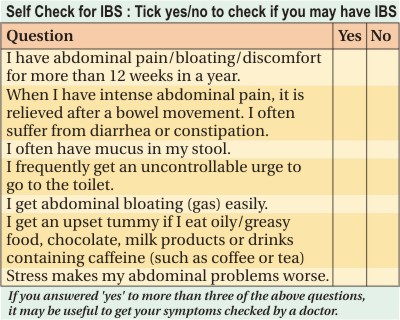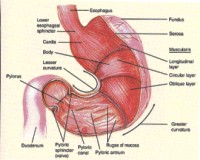|
Health
When the Stomach Rumbles
Mehtab Ghazi Rahman
Do you suffer regularly from abdominal pain, bloating or cramping? Do you have alternating diarrhoea and constipation? Have you noticed mucus in your stool? Do certain spicy or oily food, wheat and milk products and stress make your abdominal pain worse? If you have answered affirmatively to some of these questions, it may be likely that you suffer from a condition called 'Irritable Bowel Syndrome (IBS)'.
 IBS is a syndrome of the digestive system that is characterised by abdominal pain, bloating, cramping and alternating diarrhoea and constipation. Although the condition may be highly distressing, the good news is that IBS does not cause any damage to our gastro-intestinal system and does not lead to any serious illnesses such as cancer in the long-run. The main problem most IBS patients complain about is the detrimental effect the condition has on one's social and professional life. During an acute attack, many sufferers find it extremely difficult to work, attend social invitations or travel, even for short distances. IBS is a syndrome of the digestive system that is characterised by abdominal pain, bloating, cramping and alternating diarrhoea and constipation. Although the condition may be highly distressing, the good news is that IBS does not cause any damage to our gastro-intestinal system and does not lead to any serious illnesses such as cancer in the long-run. The main problem most IBS patients complain about is the detrimental effect the condition has on one's social and professional life. During an acute attack, many sufferers find it extremely difficult to work, attend social invitations or travel, even for short distances.
When you present to your doctor with the symptoms suggestive of IBS, he/she will take an extensive history of your problems, as the diagnosis of this condition is almost entirely based on a clinical-history. Sometimes, the doctor may wish to do a few tests, such as blood tests and stool sample analysis, to ensure that the symptoms are not being caused by another gastro-intestinal problem. To rule out any sinister medical problems, your doctor may also advice a camera test of your intestines (sigmoidoscopy or colonoscopy), which involves the passage of a small flexible camera into your colon. If you have been noticing blood in your stool or have had significant weight loss over the past few weeks along with intense abdominal pain, please go and see a doctor immediately.  Although many people suffer from IBS, only a few seek help from their doctors to help relieve their symptoms. In fact, in a recent survey, it was estimated less than 70% of those with IBS seek help for their symptoms. Although there is no cure for IBS as yet, doctors can help you by prescribing some medications and give you lifestyle advice to keep the debilitating symptoms of IBS at bay. Many medications are available to help relieve the symptoms of IBS. Fibre supplements can be given for constipation, loperamide for diarrhoea, antispasmodics for abdominal pain. A new drug called Lotronex is currently being trailed for those individuals who have severe IBS that does not respond to conventional therapy. Although many people suffer from IBS, only a few seek help from their doctors to help relieve their symptoms. In fact, in a recent survey, it was estimated less than 70% of those with IBS seek help for their symptoms. Although there is no cure for IBS as yet, doctors can help you by prescribing some medications and give you lifestyle advice to keep the debilitating symptoms of IBS at bay. Many medications are available to help relieve the symptoms of IBS. Fibre supplements can be given for constipation, loperamide for diarrhoea, antispasmodics for abdominal pain. A new drug called Lotronex is currently being trailed for those individuals who have severe IBS that does not respond to conventional therapy.
One of the commonest causes of IBS related abdominal problems is stress. Many people wonder why mental pressure often causes abdominal pain. This is because some 'autonomic' nerves connect the brain and the colon. These nerves arising from the brain regulate the normal contractions of the colon. In IBS, the colon becomes very sensitive, and has an exaggerated response to the slightest nervous stimulation during times of stress. Stress makes the brain very aware of the discomforting sensations arising in the colon, making the patient perceive these feelings as being unpleasant and painful.
 |
People who have IBS cannot digest greasy food. |
It is recognised globally that the best way to tackle IBS is by changing one's diet and eating carefully. The first thing to do is to identify correctly the type of food(s) that is causing you distress, and avoiding these completely. Dairy products are often blamed for abdominal pain by IBS patients, but eating natural yoghurt should be all right. Dairy products contain a lot of calcium and nutrients required by your body, so if you get cramps after eating dairy food, then ensure that you replace the nutrients you are missing out on if you are avoiding milk products. Eat lots of food that are rich in fibre, such as whole grain bread, corn flakes, fruits and vegetables, as these ease constipation and keep the colon distended, which helps to prevent spasms. But be careful, as too much fibre may cause gas formation and bloating of your tummy. If you have diarrhoea, drink plenty of water and fluids to make up for lost salt and water. If you get gas in our stomach easily, then make sure you eat slowly during meals. Large meals should be avoided as these cause cramping and diarrhoea. Smaller and more frequent meals are best for IBS patients. Eat lots of food rich in carbohydrates such as pasta, rice, bread, cereals and fruits and vegetables
IBS may be a difficult illness to treat, but it is relieving to know that it does not cause any long-term or permanent damage to the intestines. Many studies have been done, but no link has been established between IBS and other diseases such as Crohn's, Ulcerative Colitis or cancers.
The prognosis of IBS is excellent, and as long as a patient follows the doctor's advice and makes simple dietary changes, irritable bowels should be well controlled for life. .Copyright
(R) thedailystar.net 2009 |
|
